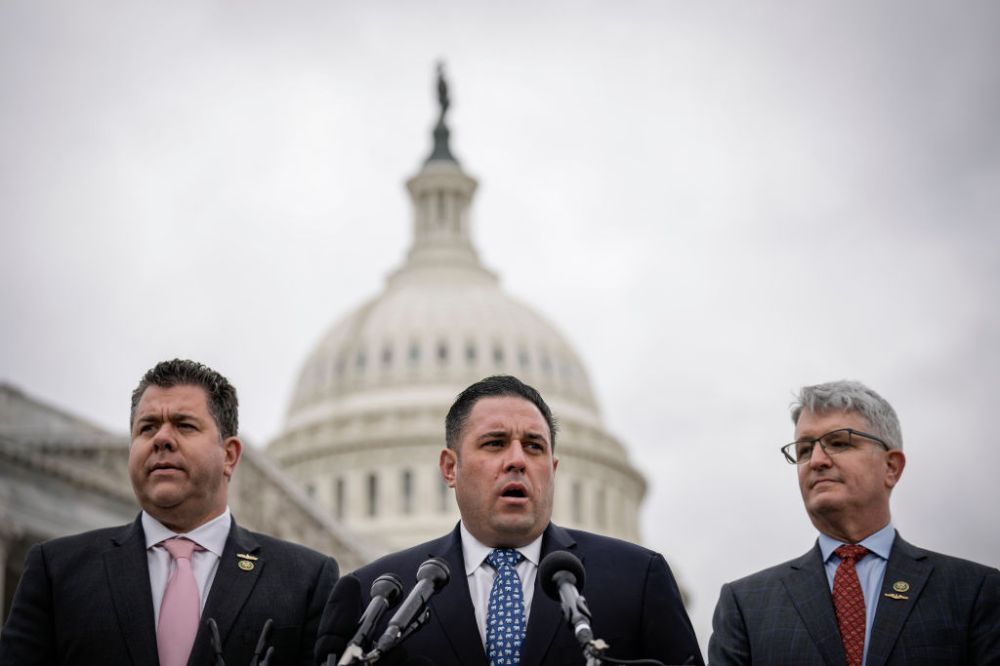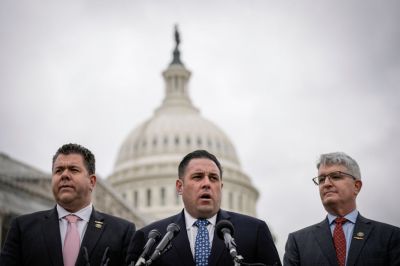Happy Wednesday! Freaked out by AI? Democratic campaign operatives say that’s too bad! “The Democratic Party has begun testing the use of artificial intelligence to write first drafts of some fund-raising messages, appeals that often perform better than those written entirely by human beings,” the New York Times’ Shane Goldmacher reports. “Inside campaigns, artificial intelligence is expected to soon help perform mundane tasks that previously required fleets of interns.”
Up to Speed
- Add a new name to the list of potential Republican presidential candidates: North Dakota Gov. Doug Burgum. He was in Iowa last week for a meet-and-greet hosted by the Story County GOP. Not every Republican invited to headline a GOP event in the Hawkeye State is a White House aspirant, a point aptly made by North Dakota columnist Rob Port. But a source in Iowa told Port: “I just completed an opinion poll by an agency clearly hired to see if the North Dakota governor can run for president.” Burgum’s campaign spokesman had not responded to a request for comment from The Dispatch at press time Wednesday morning.
- Former Vice President Mike Pence must testify in front of a grand jury about conversations he had with former President Donald Trump in the lead-up to the storming of the Capitol on January 6, 2021, a federal judge ruled Tuesday, in the Justice Department’s broader investigation into Trump’s efforts to overturn the 2020 election. Several news outlets confirmed the ruling, which is still under seal.
- Two-term Democratic Sen. Elizabeth Warren said in a video announcement Monday that she will run for reelection in 2024.
- The pro-Ron DeSantis super PAC Never Back Down nabbed another former Trump aide, Matt Wolking, to serve in a communications role, a sign that the Florida governor’s still unannounced presidential campaign is quickly emerging. Wolking will join a group of experienced operatives at Never Back Down, including former senior Trump official Ken Cuccinelli, former Trump 2020 communications director Erin Perrine, and coveted GOP strategist Jeff Roe, the architect of Sen. Ted Cruz’s 2016 presidential campaign and Virginia Gov. Glenn Youngkin’s victory in 2021.
New York: Where House Majorities Are Won
ISLAND PARK, New York—Sitting in a small coffee shop in his hometown Saturday morning, GOP Rep. Anthony D’Esposito couldn’t stop smiling about his surprise victory in New York’s 4th Congressional District—a Long Island seat President Joe Biden carried by double digits two years ago.
In D’Esposito’s words, “nobody in a million years” predicted a Republican could win his seat. But he did—by 3.5 points.
“There’s always that thought that Republicans have to be so careful not to stand for their conservative values because New York is so Democrat, and I just don’t see that,” D’Esposito said in a wide-ranging interview with The Dispatch last weekend near his campaign headquarters in Island Park, a small village located in the southwest corner of Long Island.
But now comes the hard part for D’Esposito, a retired police detective and former Hempstead Town Council member just two months into his first congressional term: figuring out how to hold onto his seat in a presidential year.
As one of four Empire State Republicans to flip Democrat-held seats last cycle, D’Esposito and his fellow New York freshmen are already bracing for brutal reelection battles in 2024. And this time, Republicans won’t have 2022 gubernatorial nominee Lee Zeldin atop the ticket to energize GOP voters.
For Democratic campaign operatives, the math is simple: Flip five seats to retake the majority. And considering six of the 18 currently Republican-held districts Biden carried in 2020 are in New York, Democrats have already made the financial calculus that the Empire State is their best shot at flipping the chamber.
Last month, the House Majority PAC (HMP) pledged $45 million in Democrats’ bid to retake coveted New York seats in Long Island and the Hudson Valley. That money is already going to good use in digital ads, billboard campaigns, and opposition research investments, according to HMP Communications Director C.J. Warnke.
“We’re gonna start this New York war room, which is basically a comms and research operation that’s with the full intention of making these guys’ lives as terrible as possible,” Warnke said in an interview last week. That means every vote, radio hit, and committee hearing gaffe will be “under constant scrutiny” from Democrats.
New York Democrats will also benefit from the state being home to House Minority Leader Hakeem Jeffries, a powerhouse fundraiser from Brooklyn who raked in more than $9 million in February alone.
But is money enough for Democrats to rehabilitate their image in the eyes of independent voters?
The 2022 midterms suggest Empire State Democrats made a series of strategic messaging missteps on the campaign trail surrounding rising crime—an issue that in many ways eclipsed independent voters’ concerns about the overturning of Roe v. Wade.
“The reason Democrats in other states did better, particularly swing states, is because in most states, abortion was not protected in their constitutions,” state Democratic Chairman Jay Jacobs told The Dispatch in December. “In New York, that didn’t stick. At the time we would hear from women: ‘It’s never going to change in New York.’”
Last year “was a law enforcement year” and Democrats missed the mark, according to Jacobs.
That reality came to the fore on the gubernatorial debate stage in late October, when incumbent Gov. Kathy Hochul dismissed Zeldin’s concerns about New York’s new bail law. “Anyone who commits a crime under our laws, especially with the change they made to bail, has consequences. I don’t know why that’s so important to you,” Hochul said to Zeldin, who only months earlier fended off an attempted stabbing during a campaign event in upstate New York. Hochul won reelection two weeks later by only 6 points in a state that gave Biden more than 60 percent of the vote.
The viral debate moment still haunts some New York Democrats. “There’s a way to say that you can look at the actual statistics of what’s going on here while emphasizing people’s fears,” said one Democratic operative working on New York races. “People want to hear that their concerns are not crazy or factually wrong.”
Party operatives are hoping Democratic Sen. Kirsten Gillibrand, up for reelection in 2024, will learn from Hochul’s mistakes.
As she and other Democrats strategize on their public safety messages, House Democrats are jumping at the opportunity to link vulnerable Republicans to scandal-ridden freshman GOP Rep. George Santos. In late February, the Democratic Congressional Campaign Committee (DCCC) launched a billboard campaign tying five New York Republicans—D’Esposito, Mike Lawler, Marc Molinaro, Nick LaLota, and Brandon Williams—to Santos, who represents the state’s 3rd District.
D’Esposito is one of many New York Republicans to cut ties with Santos, who is currently under investigation by local and federal authorities for what seems to be an endless web of lies about his background.
“He is this definition of a sociopath,” D’Esposito said of Santos. “He’s playing games with one of the most storied institutions in the world.”
Potentially more damaging to New York Republicans than Santos is former President Donald Trump, the current frontrunner in the GOP presidential primary field.
For now, D’Esposito says he’ll support whoever is at the top of the ticket, though he isn’t exactly gung-ho about the former president’s reelection campaign. “If you’re just looking at the numbers, clearly Donald Trump didn’t do terrific in this district. So that is a concern,” he said of the former president’s 14.5-point loss in his Long Island district. “But Joe Biden’s a different person at this point. And I think that those numbers that we saw in 2020 are not indicative of what we’re gonna see in 2024.”
Utah Republicans Predict Romney Runs—and Wins
Nobody knows for sure, because Mitt Romney isn’t saying. But Republicans in Utah are expecting the first-term senator to seek reelection in 2024.
At age 76 and considered persona non grata in some quarters of the Republican Party, some speculate that Romney might retire rather than forge ahead with another GOP primary campaign. But Republican insiders monitoring Romney’s activities say he is doing everything you’d expect him to do if he were planning for a 2024 Senate bid. Party stalwarts in Utah say that’s because he is.
“Both interested observers and potential candidates are waiting eagerly to see if he runs again, and I think most people expect him to do so,” said Chris Karpowitz, political science professor at Brigham Young University in Provo.
Clearly, the senator is taking his time with any announcement, whatever it turns out to be.
Romney isn’t your usual freshman lawmaker. The former Massachusetts governor was the Republican Party’s nominee for president in 2012 and—despite a rather predictably conservative voting record on Capitol Hill—has distinguished himself as a prominent GOP opponent of former President Donald Trump. A majority-Democratic House impeached Trump twice during his presidency, and Romney voted twice to convict him at trial in the Senate.
In the old days, when Utah Republicans used to choose their nominees via a vote of grassroots delegates to the state party convention, Romney might have been in deep trouble. In 2010, now-Sen. Mike Lee ousted then-Sen. Bob Bennett at the Utah GOP convention, part of a Tea Party backlash against the Republican establishment. Indeed, even in 2018, as a relatively popular Senate candidate, Romney still fell short in his bid for the nomination in a vote of Utah Republican Party convention delegates.
But Romney had an advantage Bennett didn’t have eight years earlier. State law was changed in 2014, making it possible for candidates to bypass the party convention and run in a traditional primary open to all registered Republican voters—as long as they submit enough signatures to earn a spot on the ballot. So after losing to state Rep. Mike Kennedy at the Utah GOP convention, Romney defeated him in a subsequent primary, winning with more than 71 percent of the vote.
The outcome wasn’t very surprising. Romney is a Mormon with deep roots in Utah despite spending his earlier political and business career in Massachusetts. Add to that his management of the 2002 Winter Olympics in Salt Lake City, which he is credited with saving from disaster, and you had a near-universally loved Republican in the unique position of being able to criticize Trump without having to worry about a grassroots revolt. But is Romney as politically formidable in a Republican primary today?
Yes and no, Republican insiders in Utah tell us. Yes, in that they predict he’ll win a 2024 Senate primary. However: “It will be expensive, ugly and messy,” cautioned one such GOP insider. A spokesman for Romney declined to comment.
Eyes on the Trail
- ‘What I did to Marco’: Chris Christie was in New Hampshire this week previewing what a 2024 bid for the Republican presidential nomination could look like for the former New Jersey governor. During a town hall meeting in this key early primary state, Christie took aim at frontrunner Donald Trump, telling voters he is uniquely equipped to block the former president’s campaign to return to the White House. “You better have somebody on that stage who can do to him what I did to Marco, because that’s the only thing that’s gonna defeat Donald Trump,” the Associated Press reported. Christie was referring to his epic takedown of Marco Rubio in the GOP’s 2016 primary. The Florida senator had emerged from a third-place finish in the Iowa caucuses with momentum and was skyrocketing in the polls heading into Primary Day in New Hampshire. Then he ran into a buzzsaw on a Manchester debate stage in the form of Christie. Rubio was never quite the same, finishing fifth in the Granite State and a distant second in South Carolina. (Christie finished sixth in New Hampshire and exited the race.) The former governor is headed back to the “first-in-the-nation” primary state in April and is expected to make a decision about a second presidential bid within eight weeks, although a public announcement could come later.
- Dave McCormick poised to mount another senate run: ICYMI, Audrey reported a story for the site Tuesday on what’s next for Dave McCormick, the 2022 candidate for U.S. Senate in Pennsylvania who lost the GOP nomination to Dr. Mehmet Oz by fewer than 1,000 votes. Many Pennsylvania Republicans are eager for a McCormick rerun against three-term incumbent Democrat Bob Casey in 2024. That includes GOP Reps. Dan Meuser—“a lot of people are encouraging him to run”—and Lloyd Smucker— “he’ll be a great candidate.” More from Audrey’s piece: “McCormick has spent recent weeks glad-handing with influential Republicans in Washington, D.C., sitting for interviews to promote his new book, and launching a new political action committee aimed at helping the Pennsylvania GOP close Democrats’ mail-in voting gap and boosting Republican candidates for state office.”








Please note that we at The Dispatch hold ourselves, our work, and our commenters to a higher standard than other places on the internet. We welcome comments that foster genuine debate or discussion—including comments critical of us or our work—but responses that include ad hominem attacks on fellow Dispatch members or are intended to stoke fear and anger may be moderated.
With your membership, you only have the ability to comment on The Morning Dispatch articles. Consider upgrading to join the conversation everywhere.